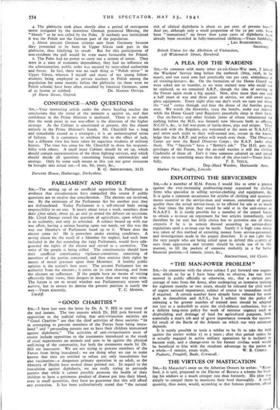PARLIAMENT AND PEOPLE
Sta,—The setting up of an unofficial opposition in Parliament is evidence that circumstances have compelled this course if public questions are to receive due consideration. The electors are involved, too. By the extension of the Parliament Act for another year they are disfranchised. Today Parliament is a self-elected body owing responsibility to no one. It meets about twice a week, members draw their £600 salary, about 30, 40 and 50 attend the debates on occasions. Mr. Lloyd George raised the question of agriculture, upon which he is an authority, and only 50 attended. A subject bound up with our war effort, having a serious bearing upon our needs, yet this was the way our Members of Parliament faced up to it. Where does the elector come in? He is powerless under existing conditions. A saving clause for the recall of a Member for neglect, had such been included in the Act extending the 1935 Parliament, would have safe- guarded the rights of the elector and served as a corrective. The voice of the people is being stifled. The constituencies should have their unofficial constituency vigilance-committee, consisting of members of the parties concerned, and thus exercise their rights by means of moral pressure upon their Members: A healthy public opinion isi the nation's best asset. The present Parliament has no authority from the electors ; it exists on its own choosing, and from the electors on sufferance. If the people have no means of voicing effectively their views, then dangers in more than one way may arise. The future is yet to reveal whether our Parliamentary system will survive, but to ensure its demise the present position is surely the






























 Previous page
Previous page